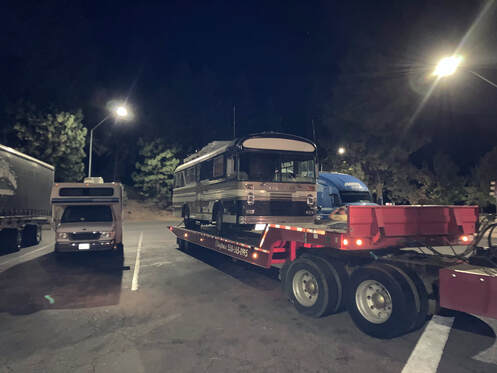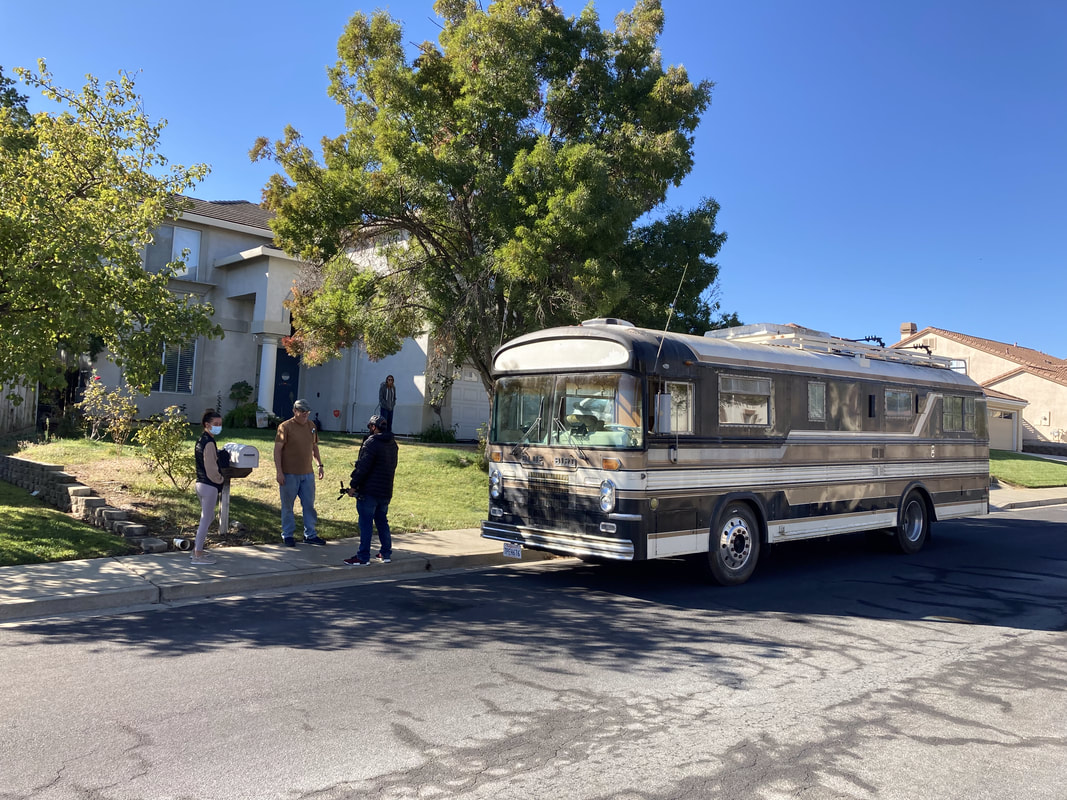|
The bus needs a water heater. Jim in California had one for me but it would require a 12 inch square hole be cut into the side of the bus and he and I agreed that seemed a bad idea. Once I was back home, I started searching on Craigslist for one which could be run on shore power or the generator (110V) and ideally on engine coolant so we could be more environmentally friendly by using waste heat from that big V-8 engine lurking under the nose of the bus. I found one for sale at half price, still in the box in Kasilof which is down on the Kenai Peninsula. I contacted Bob, the seller, and we began to arrange to have it shipped up to Anchorage as I have no spare time to drive down to collect as all my non-clinic time is now devoted to the bus. I mentioned some where along the way what I wanted the heater for as it is designed for a boat and I did not want Bob to think I was crazy. As Bob and I refined the details and I asked how I could send him the money, I got this email back:
Adam, I lost my only son Tuesday morning. He has struggled with TBI for the past 32 years and he died in his sleep ... he was 48 years old. My wife and I will donate the heater to your TBI Clinic project ... this would be the best outcome. We will deliver the heater today to American Fast Freight in Soldotna. Please give us ship to instructions so they know what to do with the freight .Happy to do this for you. Bob Correia Kasilof, Alaska Fortunately, I was working on a presentation for a class on brain health I am teaching and was not going in to see patients because, on reading this, I burst into tears and was in tears for some time. Tears happen more readily since my TBI and this is a common consequence of brain trauma but I also feel it is because I am increasingly more closely acquainted with the pain TBI inflicts on our communities. I am struck once again not only by the magnitude of the reach of TBI but by the incredible support communities can provide. This totally random contact with Bob brought me to tears but also made me realize that despite my fears of not being able to do this project well enough or correctly to help people, I have to make it work. We have to make it work. I am clearly not alone on this mission to help Alaskans with TBI. All my struggles with mountains of paperwork for grants and IRS non-profit applications which keep me up at night are such small parts of something much bigger than me or the bus. There is a powerful force in community and the love and concern for others that comes from shared trauma and tragedy. Bob and Liz, the loss of their son, Robert Lloyd Correia, and their water heater which will be at the heart of comfort in the bus, all propel this project forward just when I feel overwhelmed by the magnitude of the task and the realization that I might not really know what I am doing. We will figure this out together! I know that again, now. In honor of you, Robert Lloyd Correia, the bus moves forward.
1 Comment
 After four days of intense and exciting work mostly on my back under the bus in the balmy weather of the North Bay area of San Francisco, I came to appreciate Jim who is not only very kind and generous but smart, talented and clever. I learned a lot from him and not just about the bus. Meeting him and spending time with him was a highlight of the trip. I also came to appreciate 1967's technology. I like things I can understand and the bus is that kind of thing. It is stout, robust and a joy to work on. The time flew by and Sunday morning came quickly and with the film crew on hand to record me driving away from Jim's house, the bus and I headed north to Tacoma where in two days time, we were to meet the ship which would take the bus to Alaska. Cruising along the freeways of central California with the windows open to the hot breeze, I reflected on the amazing thing which was just unfolding. Here was a 54 year old bus with 89K miles on the clock which had sat for 12 years, barely driven, lovingly brought back to life by Jim who had a passion for saving this old bus. I felt like I was taking over as the new caretaker for this bus which clearly had a thirst for more adventure. The bus just hummed along the highway as if eager to see over the next hill. It was exhilarating and humbling to be in the driver's seat of not only this bus which was nearly as old as I but of a project destined to help hundreds of Alaskan's suffering from Traumatic Brain Injury. My mixed state of wonder and worry about what could go wrong was interrupted occasionally by the need to get fuel. The bus has two 55 gallon tanks and gets maybe 8 miles per gallon. I never did fill the tanks fully because the pumps turned off at $100-$150. So I filled one tank till the pump stopped then filled the other. We were making good time and filled up in Redding in Northern California and kept pressing north into the mountains where the sky was filled with smoke from the forest fires which had burned forest on both sides of I-5 and were still burning in the distance. As we climbed up a grade into the glowing orange sky of early evening, the bus slowed and then stopped and would not start. I eased backwards onto the shoulder and ran through the possibilities of what might have happened. It turns out the two alternator belts had broken so we were stuck until I could replace those. It was rapidly growing dark and fortunately, at Jim's recommendation, I had joined Coach Net which provides roadside assistance for Class A motorhomes. I called the number and gave them my newly minted membership number which was less than 24 hours old. The woman who answered was very kind and told me that they would call a tow truck to take me to a safe place and then get me to a shop in the morning to have any necessary work done. I knew I could do the work myself and save not only money but time so we agreed they would tow the bus to a near by rest area for the night and we would see what the morning brought. Since this is a remote part of the state, I was not surprised to hear it would be 5 hours for the truck to arrive and equally unsurprised when it took 6. It was an amazing thing to wait under the star filled sky feeling the bus rock from side to side as the big 18 wheelers zipped by. it gave me time to reflect on the bigger scheme of things and I was thankful I had learned to work on cars from my wife and had learned courage and tenacity from my parents. I tried to get some sleep but it was difficult and I finally gave up and put my headlamp on and started working on some projects in the bus hoping a truck would not veer of the road into us. The tow truck, actually a landoll, appeared out of the dark and within 45 minutes the bus was on the trailer headed back south to the rest area. It was impressive to watch the driver load and unload the 31 foot bus in the dark. That night, I slept on the floor of the bus waking periodically to think through what I needed to do in the morning. I had sent the film crew on ahead to get a motel and figured in the morning, I could ask them to look for parts and bring them back to the bus where I could install them. With that plan in place, I fell asleep to wake at dawn ready to go. I called Lauren and texted her the things I needed. As I waited for her, I marveled at the fact that my phone had service since in many places in Alaska, even along our biggest highways, do not. Lauren sprang into action and after visiting several auto parts stores, drove back to me with parts in hand. I quickly adjusted the alternator, installed the belts, tensioned them, installed the new battery and we were on our way again. I had lost a lot of time but the bus was eager to go as was I and we agreed to go faster today. We averaged 65-70mph on our way to Eugene OR where I met my daughter and son-in-law and after a quick visit with interviews by the film crew included, my daughter joined me in the bus and we raced through the dark to Tacoma to make IKEA before it closed. We pulled into IKEA with an hour to shop before they closed. We worked efficiently with a list prepared by my wife and were out and back on the road by 945pm. We pulled into a rest area just north of Tacoma around 1 AM and spread out on the floor and were asleep in minutes. The next morning after quick trip to Trader Joes for some food, we drove to the Port of Tacoma and were met by the film crew and Lisa and Paul from Tote Maritime who gave as a very warm welcome and a tour of the facility. After a few hours of interviews, filming and geting the bus settled for the journey north, we all crammed into Lauren's care and raced to catch our flights out of SEATAC. Five days later, today in fact, I picked the bus up from the Port of Anchorage and drove it to the clinic where I settled it in for its winter rest and restoration/remodeling. It felt lovely to be back behind that huge steering wheel knowing the bus and I were thousands of miles closer to our goal. I wondered how the bus felt in the sub freezing weather. It is quite a change from the south west where I think it has spent most, if not all, of its life. Now that the bus in actually here, we can start the work necessary to get it on the road by May 2022. I can also be more specific about our needs and will post those on the How to Support Us page as the project moves forward. |
Details
Archives
January 2023
Categories |

 RSS Feed
RSS Feed